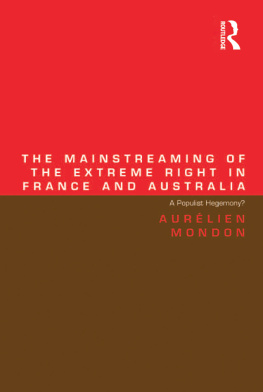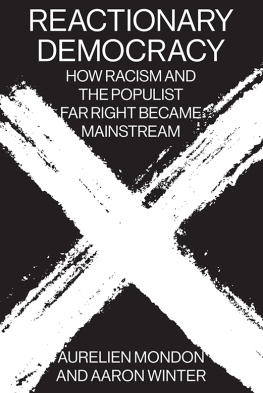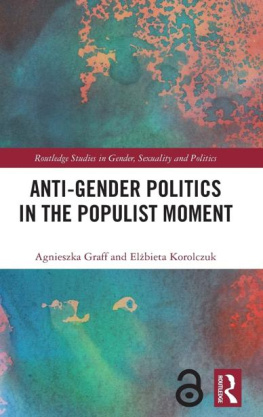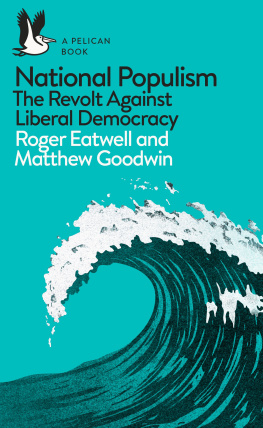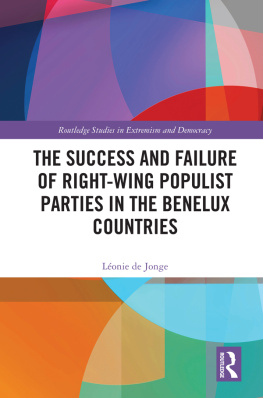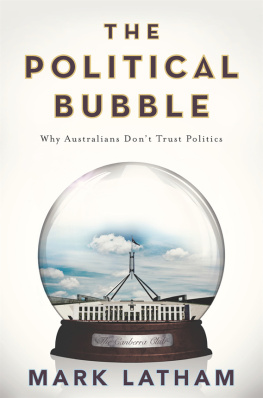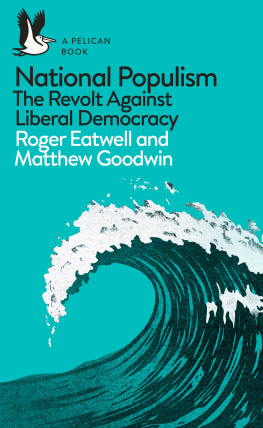THE MAINSTREAMING OF THE EXTREME RIGHT IN FRANCE AND AUSTRALIA
For Alexandra
The Mainstreaming of the Extreme Right in France and Australia
A Populist Hegemony?
AURLIEN MONDON
The University of Bath, UK
First published 2013 by Ashgate Publishing
Published 2016 by Routledge
2 Park Square, Milton Park, Abingdon, Oxon OX14 4RN
711 Third Avenue, New York, NY 10017, USA
Routledge is an imprint of the Taylor & Francis Group, an informa business
Copyright 2013 Aurlien Mondon
Aurlien Mondon has asserted his right under the Copyright, Designs and Patents Act, 1988, to be identified as the author of this work.
All rights reserved. No part of this book may be reprinted or reproduced or utilised in any form or by any electronic, mechanical, or other means, now known or hereafter invented, including photocopying and recording, or in any information storage or retrieval system, without permission in writing from the publishers.
Notice:
Product or corporate names may be trademarks or registered trademarks, and are used only for identification and explanation without intent to infringe.
British Library Cataloguing in Publication Data
Mondon, Aurlien.
The mainstreaming of the extreme right in France and Australia : a populist hegemony?.
1. Right-wing extremists France. 2. Right-wing extremists Australia. 3. Populism France. 4. Populism Australia. 5. France Politics and government 1958 6. Australia Politics and government 1945
I. Title
324.24403dc23
The Library of Congress has cataloged the printed edition as follows:
Mondon, Aurlien, author.
The mainstreaming of the extreme right in France and Australia : a populist hegemony? / by Aurlien Mondon.
pages cm
Includes bibliographical references and index.
ISBN 978-1-4094-5260-7 1. Right-wing extremistsFranceHistory21st century. 2. PopulismFranceHistory21st century. 3. Right-wing extremistsAustraliaHistory21st century. 4. PopulismAustraliaHistory21st century. I. Title.
HN440.R3M66 2013
324.243603dc23
2012035837
ISBN 9781409452607 (hbk)
ISBN 9781315555898 (ebk)
Contents
Acknowledgements
This book would not have been possible without the help and support of many people.
Above all, I owe my deepest gratitude to Alexandra Stewart, whose unwavering support, help and love in these stressful years made this book what it is.
I would also like to express my deep and sincere gratitude to Professor Robert Manne, whose advice was crucial in the making of this book and whose meticulousness has been invaluable in pushing me to research ever more, but most importantly for his open mind and willingness to discuss matters on which we might not always have agreed. I would also like to thank Dr. Gwenda Tavan for her support and constructive criticism. I am also deeply indebted to the La Trobe University staff for their support and friendliness, and I am particularly grateful for the generous funding provided by the Innovative Universities European Union Centre and the School of Social Sciences. My thanks are extended to Universit Lyon 2, and particularly to Dr. Helen Goethals and Dr. Keith Dixon, for their support.
I am indebted to all of my colleagues for their support, advice, knowledge and most importantly, friendship, particularly to Alex Ling for his friendship and for our political discussions and adventures, which to a great extent shaped the person I am today; to Gerhard Hoffstaedter, for his precious advice and friendship which often proved crucial in the most stressful situations; and to Jasmine-Kim Westendorf and Jem Atahan for our friendship, their advice and the Melbourne Free University project (co-founded with Gerhard Hoffstaedter), something which has given me an important reason to get out of the house these last few years.
I would also like to express my gratitude to Ashgate Publishing, and in particular to Rob Sorsby for being an incredibly helpful, motivated and supportive editor throughout the whole process.
Finally, I would like to thank my family: the one I left in France and the one I made in Australia. I wish to thank my parents for their support throughout my studies and particularly my mother for always encouraging me despite the often heavy weight of distance. My thanks also go to Antoine Rosay, Angus Bremner and Matthew Burke for their support and invaluable friendship over all these years. Finally, I would also like to thank the Bremners and Stewarts who have become a new family for me in Australia.
N.B. All quotes from French texts are translated by the author of this book, unless otherwise noted.
We need to react and I will lead the reaction.
Sarkozy, 4 February 2003
Introduction
The shape of the twentieth century has been dramatically influenced by the extreme right; its movements, parties and organisations are often considered to have led to the darkest hours of our history and to the genocide waged during the Second World War. History tells us that only an alliance of all the free nations in the world (and the now-discredited USSR) was able to bring this epitome of evil to its knees. For some, the fascists and thus the extreme right were dealt a mortal blow from which they would never be able to recover. Their ghost would only remain in small mimetic organisations of neo-Nazis and collectors of memorabilia. As such, fascism is widely agreed to be locked as an epochal phenomenon: it lasted from the First World War and the Great Depression to the fall of the Third Reich. Anything that followed was either marginal and irrelevant, or simply different. Yet some historians have argued that, rather than the evil of fascism itself, the Allies fought the expansionist views of the Axis, especially of Nazi Germany. While noble aspirations are commonly celebrated as the motivation for the alliance of various nations, it can be argued that more opportunistic ends justified the means: at a time when empires were still thriving, German expansionism became a serious threat to the most powerful nations in the world. It is this perspective that offers a less emotional explanation for the resurgence of the extreme right from the 1980s onwards. Instead of the end, 1945 marked a dusk that fell on the extreme right. In this context, what dawned forty years later is less surprising as it becomes clear that the roots of the extreme right and fascism had not been eradicated.
Since the 1980s, most Western countries have borne witness to a resurgence of extreme right parties within the official and legal realms of parliamentary democracy. Despite varying degrees of success, it is clear that not only did these parties create earthquakes in their respective countries and sometimes in the international community, but also that, regardless of their capacity to win elections or even remain credible for more than a few years, they have dramatically reshaped the entire political arena in which they operate (Wilson and Hainsworth 2012). This kind of politics, widely discredited after the Second World War, was allowed to return to centre stage as Western countries were experiencing dramatic economic changes. The general abandonment of progressive welfare policies for more deregulated economies was considered a necessary change by the political elite from all mainstream parties. The degrees of divergence between conservative, neo-liberal and labour or socialist parties were therefore limited to minor policy aspects of the neo-liberal reforms, which in turn led to the narrowing of electoral choices. Such choices were narrowed further when the USSR finally collapsed: the extreme left appeared defeated and unable to detach itself from the Soviet failure and the massacres committed across the globe in the name of communism. The communist hypothesis seemed to have been dealt a lethal blow. However, people were not ready to accept the end of history and made it clear across Europe, but also Australia, that political antagonism remained and that another way forward could/should be identified. In a context where the policies of mainstream government parties had converged and the left had lost legitimacy, the extreme right re-emerged to fill a void which had left many feeling deeply excluded by, and disillusioned with, the system.

